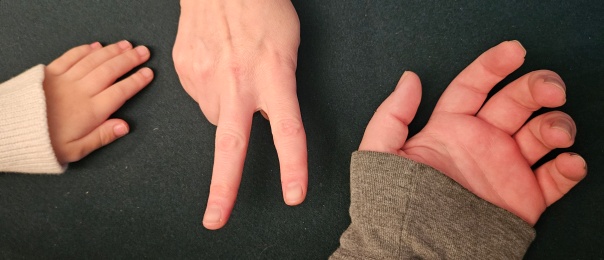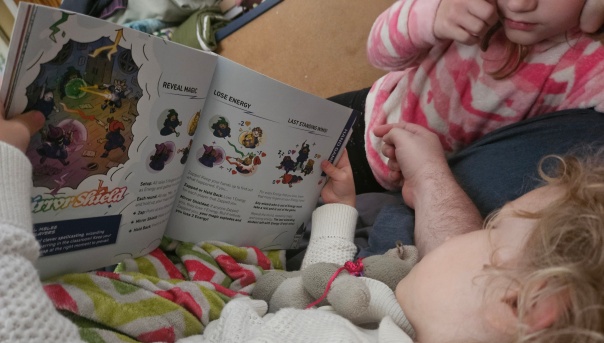Four Hands and a Spare Finger
We play a lot of board games as a family. Short games, long games, campaign games. Everything. Over the past couple of months, however, we’ve fallen into the event horizon of a single book. It’s a slim thing, just the right size to sit against the window by the dinner table. Every evening, we’ve barely started eating before my daughters ask the question. “Daddy? Can we play a hand game?”
Internet, if you turn this cherished memory into something weird, it’s straight to jail for you.
The book in question is Hand Games 21. Written and designed by Don Eskridge, creator of The Resistance, this is a collection of twenty-one games that require nothing except your wiggle-piggies, leprechauns, ladybugs, or whatever your family’s pet appellation for hands happens to be. As suits the game’s component list, these are simple games. Each one is contained within a single two-page spread, can be summed up in three steps at most, and includes illustrations by Zak Eidsvoog that set the tone and provide examples of play.
Right away, the entire project is a living example of how self-imposed limitations can inform and spur creativity. Going in, I had my reservations. Everybody’s played the basics, hand games like roshambo, thumb war, odds and evens, red hands, bloody knuckles, mercy, five-finger fillet… it occurs to me that I’ve played a high number of rather nasty hand games. In my early twenties, I was introduced to one where somebody wrenches apart your fore- and hind-fingers, causing obvious distress to your palmar muscles, and the resulting grunt of displeasure is declared to be the noise you make during sex.
Goodness, some people are insufferable.
Eskridge declines to expound on such cruelties. To a one, his games are whimsical delights that cover a range of genres. Perhaps the most customary selections are those that I would term “counting games,” in which players race to score a certain number of points — usually tracked on their free hand — before anybody else. Eskridge mines this framework to great effect. Cash & Slash pits everybody against their neighbors to gather or block wads of imaginary dollars. Mirror Shield sees wizards either zapping one another or turning magic missiles against their casters. Perfect Block is a duel of attrition between a martial arts master and two unruly disciples to see which side will first succumb to a series of lightning-fast blows.
While these games are the most traditional of the bunch, evoking classic hand games like morra or chopsticks, they’re only the barest fragment of the selections found within. There are logic puzzles like The Guardian, where everybody works together to bypass one person’s hidden combo of raised and curled fingers, real-time offerings like Air Pong that force two players to flail wildly over three imagined nets, games that occupy physical space such as Table Tank, which sees everybody’s ladybugs transformed into war machines that spout white-hot death from their fingertips. No surprise from the designer of The Resistance, there’s also a healthy selection of social deduction games. We haven’t played many of those; their complexity is slightly out of reach of my four-year-old.
But that’s the beauty of this project. For every game that’s too complicated or that we aren’t in the mood for or, dare I say it, that looks a little boring, there are two or three more that spark the imagination. Yesterday afternoon, my kids dragged the book into a cuddle session just to look at the pictures and discuss which game they wanted to try next. While my ten-year-old read the rules, her younger sister traced the illustrations with her fingertips and tried to figure out what each game consisted of from the pictures alone. “Which game will Stripes like?” she asked, referring to the kitten stuffy that accompanies her everywhere. “Maybe Dance Party,” I said, and showed them a game about flashing unique numbers. She said, “Like this?” and threw up a knuckle-aching combo that was indeed unlike any gesture I’d ever seen before.
“Yes,” I said. “Like that.”
As a monument to creativity — a small monument, diminutive but vital — there’s nothing quite like Hand Games 21. It isn’t only that there are a lot of them. It’s that they revel in the effortlessness of play, the joy of play, the necessity of play. It reminds us that we’re homo ludens, the playing man, creatures that are brought into being by our imaginations and our willingness to enter the magic circle. The back of the book walks readers through the process of creating their own hand games, including a rough draft for what might have been the book’s twenty-second game. That it has been offered to us unfinished is a wonderful thing. This book didn’t need one more game. The invitation to create, though? To imagine our own games, no matter how small, no matter that they don’t require anything other than what we bring with us? That maybe, even in the process of reading the rules, a four-year-old might invent an entirely new game of her own by accident?
Yes. Like that. Don Eskridge has fashioned something truly remarkable. That he has allowed us to share in that fashioning is perhaps the most precious part. Hand Games 21 is many things: anthology, exercise, experiment. More than anything else, it’s a reminder that we don’t need anything special, anything plastic or expensive or complex, in order to play.
(If what I’m doing at Space-Biff! is valuable to you in some way, please consider dropping by my Patreon campaign or Ko-fi.)
A complimentary copy was provided.
Posted on May 21, 2024, in Board Game. Bookmark the permalink. 5 Comments.



Love it!
Thanks!
Delightful!
Hey Dan, I just picked up the book hoping I can use some hand games as quick entertainment for my kids (5 and 7 years old) when they start to get a bit restless in a restaurant or at the grocery store or whatever. Do you have any recommendations on which games we should start with, or which have been the easiest for your younger kids to pick up on?
Honestly, we just go through page by page until we settle on something everybody thinks sounds interesting.
But we’ve had good success with Fair Split, 1 2 Out, Number Stomp, Mirror Shield, Dance Party, and The Guardian.